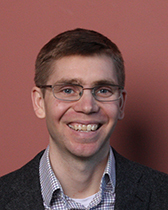Faculty Spotlight: Todd Gingrich

By Irena Garic
What Chemistry class / professor did you enjoy the most as an undergraduate student and why?
I was enthralled by Harry Gray. He made inorganic spectra seem incredibly cool. Harry had (and still has) boundless energy and enthusiasm, and I was captivated by the use of quantum mechanics and group theory to understand the color of molecules. Seeing this application of physics and mathematics to chemistry problems eventually steered me toward becoming a theoretician.
Describe your teaching style?
Well I’ve only just started! It’s bound to change some with time. This year I taught a statistical mechanics course for graduate students and I’ll be teaching statistical mechanics and kinetics for ISP. I think getting practice solving problems is core to both of classes, so I’ve sought to construct problem sets which build off each other in a logically coherent and cohesive way. Through lectures (a mixture of blackboard, question/answer discussions, and some computer simulations) I aim to lay down enough of a foundation that those problems can be attacked and to provide enough of a motivation that students want to attack them.
What are your current research interests?
I’m really interested in dynamics. Despite having “dynamics” in its name, the hugely important field of thermodynamics is really a static theory describing what equilibrium chemical properties we should expect after the motion has balanced out. There are lots of chemical processes, however, for which the non-equilibrated dynamics really matters: materials can be “kinetically trapped” in nonequilibrium state or biochemical fuels like ATP can be consumed and replenished to maintain nonequilibrium steady states. One of my core interests is in developing theoretical and computation tools to probe these regimes.
What are some potential applications for the work that you’re doing?
Nature produces amazing molecular machines that harness chemical driving forces to carry out nonequilibrium processes. Most efforts to computationally design materials go after the simpler (but still very hard) problem of designing a material which will have a favorable thermodynamic ground state. Ultimately I’d like to help contribute theoretical strategies for instead designing the dynamical properties of molecular machines.
What is the best part about being at the Northwestern University?
Theoretical chemistry at Northwestern is really special. There’s a long history of scholarly work on “pure theory” but an equally important history of those theoreticians teaming up with experimental colleagues for really impactful applications of theoretical techniques. Being in a place where I can learn, and hopefully continue, this balancing act is a phenomenal opportunity!
What is one thing not on your CV that you would like us to know?
I like to recharge with a backpacking trip in the wilderness.
